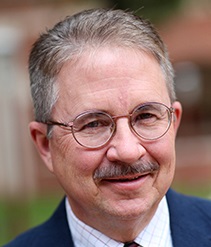By Ken Camp
The use of deadly force can be justified in a broken world inhabited by “moral monsters,” Baptist ethicist Roger Olson told students at Baylor University’s George W. Truett Theological Seminary Nov. 6.
“The kingdom of God is not yet, and, in the meantime, this time between the times, it is our duty as citizens of that kingdom yet to come to approximate it in real and living ways,” said Olson, the Foy Valentine professor of Christian theology and ethics at Truett Seminary. “Sometimes that means using the powerful means we have.”
 He cautioned, however, that Christians should always regard force as a sign of the world’s brokenness and avoid “baptizing it as righteous.”
He cautioned, however, that Christians should always regard force as a sign of the world’s brokenness and avoid “baptizing it as righteous.”
“Contrary to certain modern and contemporary Christian ethicists who say an absolute ‘no’ to all Christian use of force, I must reluctantly say, with (Reformer Martin) Luther, ‘Sin boldly’ — but add, ‘Repent more boldly still,’” Olson said.
Olson framed the T.B. Maston Foundation lecture, honoring the pioneering professor of Christian ethics who taught four decades at Southwestern Baptist Theological Seminary, in the context of Machine Gun Preacher.
The controversial 2011 movie told the true story of Sam Childers, a Christian missionary who used violence to resist the so-called Lord’s Resistance Army in the Sudan and its enlistment of child soldiers.
“Is Christian involvement in social unrest, social struggle, the often messy rough-and-tumble of politics, even violence ever ethically justifiable?” Olson asked. “Should Christians engage in attempts to bring about justice in this broken world, even if that requires participating in its brokenness?
“Or ought Christians to sit on the sidelines of social conflict and beam messages of love into the fray, hoping God will use them to bring about some modicum of peace and justice?”
Olson outlined four Christian responses to those questions, highlighting strengths and weaknesses of each approach:
• The Social Gospel, exemplified by early 20th century Baptist pastor-theologian Walter Rauschenbusch, teaches the value of voluntary brotherhood achieved through moral persuasion — even pressure — but not violence.
• Christian Realism, taught by influential theologian Reinhold Niebuhr, views the world as broken and unjust. Niebuhr urged Christians to make the best of the sinful and imperfect situation by working to bring about imperfect approximations of justice, even if that means some degree of compromise with the ungodly.
• Liberation Theology, promoted by Latin American theologian Gustavo Gutierrez, teaches that Christian love requires solidarity with the poor and powerless, and justice happens when the poor are empowered.
• Christian pacifism, taught by John Howard Yoder and Stanley Hauerwas, insists Jesus did not come into the world to overthrow unjust systems but to establish an alternative social order within the broken world following principles in the Sermon on the Mount.”
Olson agreed with pacifists that Christians should help the church be the witness of peace to the world, avoiding all entanglements of the church with the state.
“The church is not called to be a launching pad for revolutionaries but a community of love,” he said. “The church should never take up arms for any cause.”
At the same time, Olson said, individual Christians “must be open to the call of God to take up power — even deadly force, if necessary — to defend the weak, the helpless and the oppressed.”
While Machine Gun Preacher was a box-office flop, in October Childers received the Mother Teresa Memorial International Award for Social Justice, in recognition of his efforts to rescue children in troubled areas.
